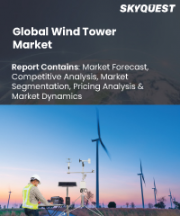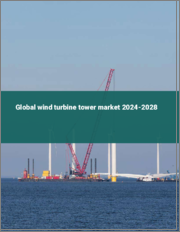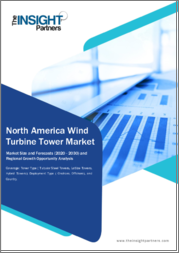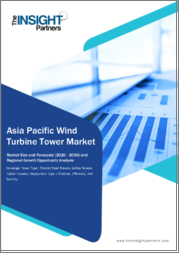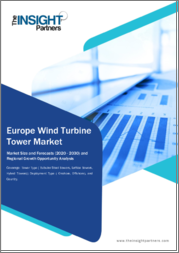
|
시장보고서
상품코드
1751335
풍력 터빈 타워 시장 규모, 점유율, 동향 분석 보고서 : 유형별, 설치 장소별, 지역별, 부문별 예측(2025-2030년)Wind Turbine Tower Market Size, Share & Trends Analysis Report By Type, By Installation, By Region, And Segment Forecasts, 2025 - 2030 |
||||||
풍력 터빈 타워 시장 규모와 동향:
풍력 터빈 타워 세계 시장 규모는 2024년 299억 4,000만 달러로 추정되며, 2025년부터 2030년까지 연평균 8.1%의 성장률을 보일 것으로 예상됩니다.
세계 각국이 탄소배출량 감축과 기후변화 대응을 목표로 하고 있어 청정하고 재생 가능한 에너지원에 대한 수요가 증가하고 있는 것이 시장의 주요 요인입니다.
각국 정부는 풍력발전 도입을 촉진하기 위해 세제 혜택, 재생에너지 목표 등 다양한 지원 정책을 시행하고 있습니다. 예를 들어, 유럽연합(EU)은 2030년까지 에너지의 32%를 재생에너지로 충당한다는 목표를 세웠고, 중국은 2060년까지 탄소 중립을 목표로 하고 있습니다.
풍력 터빈 설계 및 제조의 기술적 진보도 시장을 크게 촉진하고 있습니다. 높은 타워와 큰 로터 직경과 같은 기술 혁신은 풍력 터빈의 효율과 에너지 출력을 향상시킵니다. 높은 타워는 더 높은 고도에서 더 강하고 안정적인 바람의 흐름에 접근 할 수 있기 때문에 발전량을 증가시킬 수 있습니다. 예를 들어, 최신 세대의 풍력 터빈은 타워 높이가 100 미터를 초과하여 더 많은 풍력을 활용할 수 있습니다. 이러한 발전은 풍력 터빈의 전반적인 성능을 향상시킬 뿐만 아니라 풍력에너지의 기존 에너지원에 대한 경쟁력을 높여 시장 성장을 더욱 촉진할 것입니다.
정부의 정책과 인센티브도 세계 시장을 이끄는 또 다른 중요한 요인입니다. 세계 각국 정부는 풍력에너지 도입을 장려하기 위해 보조금, 세제 혜택, 고정가격매입제도 등의 지원 정책을 시행하고 있습니다. 예를 들어, 미국에서는 생산세액공제(PTC)와 투자세액공제(ITC)가 풍력발전 프로젝트를 촉진하는 데 도움이 되고 있습니다. 마찬가지로 중국 정부는 풍력에너지 부문을 지원하기 위해 막대한 보조금과 유리한 정책을 제공하여 세계 최대의 풍력 터빈 타워 시장 중 하나가 되었습니다. 이러한 정책적 조치는 유리한 투자 환경을 조성하여 풍력에너지 시장에 국내외 업체들을 끌어들이고 있습니다.
또한, 풍력에너지 비용의 하락은 풍력에너지 시장의 성장을 촉진하는 주요 요인으로 작용하고 있습니다. 지난 10년간 규모의 경제, 공급망 효율성 향상, 기술 혁신으로 인해 풍력발전 비용이 크게 감소했습니다. 이러한 비용 절감은 특히 풍력발전 잠재력이 높은 지역에서 풍력발전이 점점 더 매력적인 선택이 되고 있습니다. 예를 들어, 풍력발전의 균등화 에너지 비용(LCOE)은 많은 시장에서 화석 연료와 비교하여 경쟁력 있는 수준에 도달했습니다. 이러한 경제성은 풍력발전 프로젝트에 대한 투자를 촉진하고 풍력 터빈 타워에 대한 수요를 증가시키고 있습니다. 이러한 원동력이 계속 발전하고 강화됨에 따라 세계 시장은 지속적인 성장과 개척을 위한 준비가 되어 있습니다.
목차
제1장 조사 방법과 범위
제2장 주요 요약
제3장 풍력 터빈 타워 시장 변수, 동향, 범위
- 시장 계통 전망
- 침투와 성장 전망 매핑
- 업계 밸류체인 분석
- 규제 프레임워크
- 표준과 컴플라이언스
- 안전성
- 시장 역학
- 시장 성장 촉진요인 분석
- 시장 성장 억제요인 분석
- 시장 과제 분석
- 시장 기회 분석
- 비즈니스 환경 분석
- 업계 분석 - Porter's Five Forces 분석
- PESTEL 분석
제4장 풍력 터빈 타워 시장 : 설치 장소별 추정·동향 분석
- 정의와 범위
- 설치 장소별 변동 분석과 시장 점유율, 2024년과 2030년
- 해상
- 육상
제5장 풍력 터빈 타워 시장 : 유형별 추정·동향 분석
- 정의와 범위
- 유형 변동 분석과 시장 점유율, 2024년과 2030년
- 철탑
- 콘크리트 타워
- 하이브리드 타워
제6장 풍력 터빈 타워 시장 : 지역별 추정·동향 분석
- 중요한 포인트
- 지역 변동 분석과 시장 점유율, 2024년과 2030년
- 북미
- 설치 장소별, 2018-2030년
- 유형별, 2018-2030년
- 미국
- 캐나다
- 멕시코
- 유럽
- 설치 장소별, 2018-2030년
- 유형별, 2018-2030년
- 독일
- 영국
- 프랑스
- 이탈리아
- 스페인
- 아시아태평양
- 설치 장소별, 2018-2030년
- 유형별, 2018-2030년
- 중국
- 인도
- 일본
- 한국
- 호주
- 중남미
- 설치 장소별, 2018-2030년
- 유형별, 2018-2030년
- 브라질
- 중동 및 아프리카
- 설치 장소별, 2018-2030년
- 유형별, 2018-2030년
- 아랍에미리트
제7장 경쟁 구도
- 주요 기업과 최근 동향, 그리고 업계에 대한 영향
- 주요 기업/경쟁 분류
- List of key Components Suppliers and Channel Partners
- 2023년 기업 시장 점유율과 포지션 분석
- 기업 히트맵 분석
- 경쟁 대시보드 분석
- 전략 매핑
- 협업/파트너십/계약
- 신제품 발매
- 인수합병
- 연구개발
- 기타
- 기업 리스트/프로파일
- Siemens Gamesa Renewable Energy, SAU
- Arcosa Wind Towers, Inc.
- US Forged Rings Inc.
- CS Wind
- Marmen
- Modvion
- CNBM
- GRI Renewable Industries
- Vestas
- Pemamek
- PVUNITE Ltd.
- SENLISWELD
- Rohn Products, LLC
- Ventower Industries
- Global Energy(Group) Limited
Wind Turbine Tower Market Size & Trends:
The global wind turbine tower market size was estimated at USD 29.94 billion in 2024 and is expected to grow at a CAGR of 8.1% from 2025 to 2030. The market is primarily driven by the increasing demand for clean, renewable energy sources as countries worldwide aim to reduce their carbon footprint and combat climate change.
Governments are implementing supportive policies, such as tax incentives and renewable energy targets, to encourage the adoption of wind power. For example, the European Union has set a target to derive 32% of its energy from renewable sources by 2030, while China aims to be carbon neutral by 2060, driving significant investments in wind energy infrastructure.
Technological advancements in wind turbine design and manufacturing have also significantly propelled the market. Innovations such as taller towers and larger rotor diameters enhance wind turbines' efficiency and energy output. Taller towers can access stronger and more consistent wind currents at higher altitudes, which translates to increased energy generation. For example, the latest generation of wind turbines can have towers exceeding 100 meters in height, enabling them to harness more wind power. These advancements not only improve the overall performance of wind turbines but also make wind energy more competitive with traditional energy sources, further driving market growth.
Government policies and incentives are another critical factor driving the global market. Many governments worldwide are implementing supportive policies, including subsidies, tax incentives, and feed-in tariffs, to encourage the adoption of wind energy. The U.S., for instance, offers the Production Tax Credit (PTC) and the Investment Tax Credit (ITC), which have been instrumental in promoting wind power projects. Similarly, China's government provides substantial subsidies and favorable policies to support the wind energy sector, making it one of the largest markets for wind turbine towers globally. These policy measures create a favorable investment environment, attracting both domestic and international players to the wind energy market.
Moreover, the declining cost of wind energy is a significant factor triggering market growth. Over the past decade, the cost of wind power has decreased considerably due to economies of scale, improved supply chain efficiencies, and technological innovations. This cost reduction makes wind energy an increasingly attractive option for power generation, especially in regions with high wind potential. For example, the Levelized Cost of Energy (LCOE) for wind has reached competitive levels compared to fossil fuels in many markets. This economic viability encourages more investments in wind power projects, driving the demand for wind turbine towers. As these driving factors continue to evolve and strengthen, the global market is poised for sustained growth and development.
Global Wind Turbine Tower Market Report Segmentation
This report forecasts revenue growth at the global, regional, and country levels and provides an analysis of the latest industry trends in each of the sub-segments from 2018 to 2030. For this study, Grand View Research has segmented the global wind turbine tower market report based on installation, type, and region:
- Installation Outlook (Revenue, USD Billion, 2018 - 2030)
- Offshore
- Onshore
- Type Outlook (Revenue, USD Billion, 2018 - 2030)
- Steel Tower
- Concrete Tower
- Hybrid Tower
- Regional Outlook (Revenue, USD Billion, 2018 - 2030)
- North America
- U.S.
- Canada
- Mexico
- Europe
- Germany
- UK
- France
- Italy
- Spain
- Asia Pacific
- China
- India
- Japan
- South Korea
- Australia
- Central & South America
- Brazil
- Middle East & Africa
- UAE
Table of Contents
Chapter 1. Methodology and Scope
- 1.1. Market Segmentation & Scope
- 1.2. Market Definition
- 1.3. Information Procurement
- 1.3.1. Purchased Database
- 1.3.2. GVR's Internal Database
- 1.3.3. Secondary Materials & Third-Party Perspectives
- 1.3.4. Primary Research
- 1.4. Information Analysis
- 1.4.1. Data Analysis Models
- 1.5. Market Formulation & Data Visualization
- 1.6. Data Validation & Publishing
- 1.7. List of Abbreviations
Chapter 2. Executive Summary
- 2.1. Market Outlook, 2023 (USD Billion)
- 2.2. Segmental Outlook
- 2.3. Competitive Landscape Snapshot
Chapter 3. Wind Turbine Tower Market Variables, Trends, and Scope
- 3.1. Market Lineage Outlook
- 3.2. Penetration and Growth Prospect Mapping
- 3.3. Industry Value Chain Analysis
- 3.4. Regulatory Framework
- 3.4.1. Standard & Compliance
- 3.4.2. Safety
- 3.5. Market Dynamics
- 3.5.1. Market Driver Analysis
- 3.5.2. Market Restraint Analysis
- 3.5.3. Market Challenges Analysis
- 3.5.4. Market Opportunity Analysis
- 3.6. Business Environment Analysis
- 3.6.1. Industry Analysis - Porter's Five Forces Analysis
- 3.6.2. PESTEL Analysis
Chapter 4. Wind Turbine Tower Market: Installation Estimates & Trend Analysis
- 4.1. Definition & Scope
- 4.2. Installation Movement Analysis & Market Share, 2024 & 2030
- 4.3. Offshore
- 4.3.1. Market estimates and forecasts, 2018 - 2030 (USD Billion)
- 4.4. Onshore
- 4.4.1. Market estimates and forecasts, 2018 - 2030 (USD Billion)
Chapter 5. Wind Turbine Tower Market: Type Estimates & Trend Analysis
- 5.1. Definition & Scope
- 5.2. Type Movement Analysis & Market Share, 2024 & 2030
- 5.3. Steel Tower
- 5.3.1. Market estimates and forecasts, 2018 - 2030 (USD Billion)
- 5.4. Concrete Tower
- 5.4.1. Market estimates and forecasts, 2018 - 2030 (USD Billion)
- 5.5. Hybrid Tower
- 5.5.1. Market estimates and forecasts, 2018 - 2030 (USD Billion)
Chapter 6. Wind Turbine Tower Market: Regional Estimates & Trend Analysis
- 6.1. Key Takeaways
- 6.2. Regional Movement Analysis & Market Share, 2024 & 2030
- 6.3. North America
- 6.3.1. Market Estimates and Forecasts, 2018 - 2030 (USD Billion)
- 6.3.2. Market Estimates and Forecasts, by Installation, 2018 - 2030 (USD Billion)
- 6.3.3. Market Estimates and Forecasts, by Type, 2018 - 2030 (USD Billion)
- 6.3.4. U.S.
- 6.3.4.1. Market Estimates and Forecasts, 2018 - 2030 (USD Billion)
- 6.3.4.2. Market Estimates and Forecasts, by Installation, 2018 - 2030 (USD Billion)
- 6.3.4.3. Market Estimates and Forecasts, by Type, 2018 - 2030 (USD Billion)
- 6.3.5. Canada
- 6.3.5.1. Market Estimates and Forecasts, 2018 - 2030 (USD Billion)
- 6.3.5.2. Market Estimates and Forecasts, by Installation, 2018 - 2030 (USD Billion)
- 6.3.5.3. Market Estimates and Forecasts, by Type, 2018 - 2030 (USD Billion)
- 6.3.6. Mexico
- 6.3.6.1. Market Estimates and Forecasts, 2018 - 2030 (USD Billion)
- 6.3.6.2. Market Estimates and Forecasts, by Installation, 2018 - 2030 (USD Billion)
- 6.3.6.3. Market Estimates and Forecasts, by Type, 2018 - 2030 (USD Billion)
- 6.4. Europe
- 6.4.1. Market Estimates and Forecasts, 2018 - 2030 (USD Billion)
- 6.4.2. Market Estimates and Forecasts, by Installation, 2018 - 2030 (USD Billion)
- 6.4.3. Market Estimates and Forecasts, by Type, 2018 - 2030 (USD Billion)
- 6.4.4. Germany
- 6.4.4.1. Market Estimates and Forecasts, 2018 - 2030 (USD Billion)
- 6.4.4.2. Market Estimates and Forecasts, by Installation, 2018 - 2030 (USD Billion)
- 6.4.4.3. Market Estimates and Forecasts, by Type, 2018 - 2030 (USD Billion)
- 6.4.5. UK
- 6.4.5.1. Market Estimates and Forecasts, 2018 - 2030 (USD Billion)
- 6.4.5.2. Market Estimates and Forecasts, by Installation, 2018 - 2030 (USD Billion)
- 6.4.5.3. Market Estimates and Forecasts, by Type, 2018 - 2030 (USD Billion)
- 6.4.6. France
- 6.4.6.1. Market Estimates and Forecasts, 2018 - 2030 (USD Billion)
- 6.4.6.2. Market Estimates and Forecasts, by Installation, 2018 - 2030 (USD Billion)
- 6.4.6.3. Market Estimates and Forecasts, by Type, 2018 - 2030 (USD Billion)
- 6.4.7. Italy
- 6.4.7.1. Market Estimates and Forecasts, 2018 - 2030 (USD Billion)
- 6.4.7.2. Market Estimates and Forecasts, by Installation, 2018 - 2030 (USD Billion)
- 6.4.7.3. Market Estimates and Forecasts, by Type, 2018 - 2030 (USD Billion)
- 6.4.8. Spain
- 6.4.8.1. Market Estimates and Forecasts, 2018 - 2030 (USD Billion)
- 6.4.8.2. Market Estimates and Forecasts, by Installation, 2018 - 2030 (USD Billion)
- 6.4.8.3. Market Estimates and Forecasts, by Type, 2018 - 2030 (USD Billion)
- 6.5. Asia Pacific
- 6.5.1. Market Estimates and Forecasts, 2018 - 2030 (USD Billion)
- 6.5.2. Market Estimates and Forecasts, by Installation, 2018 - 2030 (USD Billion)
- 6.5.3. Market Estimates and Forecasts, by Type, 2018 - 2030 (USD Billion)
- 6.5.4. China
- 6.5.4.1. Market Estimates and Forecasts, 2018 - 2030 (USD Billion)
- 6.5.4.2. Market Estimates and Forecasts, by Installation, 2018 - 2030 (USD Billion)
- 6.5.4.3. Market Estimates and Forecasts, by Type, 2018 - 2030 (USD Billion)
- 6.5.5. India
- 6.5.5.1. Market Estimates and Forecasts, 2018 - 2030 (USD Billion)
- 6.5.5.2. Market Estimates and Forecasts, by Installation, 2018 - 2030 (USD Billion)
- 6.5.5.3. Market Estimates and Forecasts, by Type, 2018 - 2030 (USD Billion)
- 6.5.6. Japan
- 6.5.6.1. Market Estimates and Forecasts, 2018 - 2030 (USD Billion)
- 6.5.6.2. Market Estimates and Forecasts, by Installation, 2018 - 2030 (USD Billion)
- 6.5.6.3. Market Estimates and Forecasts, by Type, 2018 - 2030 (USD Billion)
- 6.5.7. South Korea
- 6.5.7.1. Market Estimates and Forecasts, 2018 - 2030 (USD Billion)
- 6.5.7.2. Market Estimates and Forecasts, by Installation, 2018 - 2030 (USD Billion)
- 6.5.7.3. Market Estimates and Forecasts, by Type, 2018 - 2030 (USD Billion)
- 6.5.8. Australia
- 6.5.8.1. Market Estimates and Forecasts, 2018 - 2030 (USD Billion)
- 6.5.8.2. Market Estimates and Forecasts, by Installation, 2018 - 2030 (USD Billion)
- 6.5.8.3. Market Estimates and Forecasts, by Type, 2018 - 2030 (USD Billion)
- 6.6. Central & South America
- 6.6.1. Market Estimates and Forecasts, 2018 - 2030 (USD Billion)
- 6.6.2. Market Estimates and Forecasts, by Installation, 2018 - 2030 (USD Billion)
- 6.6.3. Market Estimates and Forecasts, by Type, 2018 - 2030 (USD Billion)
- 6.6.4. Brazil
- 6.6.4.1. Market Estimates and Forecasts, 2018 - 2030 (USD Billion)
- 6.6.4.2. Market Estimates and Forecasts, by Installation, 2018 - 2030 (USD Billion)
- 6.6.4.3. Market Estimates and Forecasts, by Type, 2018 - 2030 (USD Billion)
- 6.7. Middle East & Africa
- 6.7.1. Market Estimates and Forecasts, 2018 - 2030 (USD Billion)
- 6.7.2. Market Estimates and Forecasts, by Installation, 2018 - 2030 (USD Billion)
- 6.7.3. Market Estimates and Forecasts, by Type, 2018 - 2030 (USD Billion)
- 6.7.4. UAE
- 6.7.4.1. Market Estimates and Forecasts, 2018 - 2030 (USD Billion)
- 6.7.4.2. Market Estimates and Forecasts, by Installation, 2018 - 2030 (USD Billion)
- 6.7.4.3. Market Estimates and Forecasts, by Type, 2018 - 2030 (USD Billion)
Chapter 7. Competitive Landscape
- 7.1. Key Players & Recent Developments & Their Impact on the Industry
- 7.2. Key Company/Competition Categorization
- 7.3. List of key Components Suppliers and Channel Partners
- 7.4. Company Market Share & Position Analysis, 2023
- 7.5. Company Heat Map Analysis
- 7.6. Competitive Dashboard Analysis
- 7.7. Strategy Mapping
- 7.7.1. Collaboration/ Partnerships/ Agreements
- 7.7.2. New Product launches
- 7.7.3. Mergers & Acquisitions
- 7.7.4. Research & Development
- 7.7.5. Others
- 7.8. Company Listing/Profiles
- 7.8.1. Siemens Gamesa Renewable Energy, S.A.U.
- 7.8.1.1. Company Overview
- 7.8.1.2. Financial Performance
- 7.8.1.3. Product Benchmarking
- 7.8.2. Arcosa Wind Towers, Inc.
- 7.8.2.1. Company Overview
- 7.8.2.2. Financial Performance
- 7.8.2.3. Product Benchmarking
- 7.8.3. US Forged Rings Inc.
- 7.8.3.1. Company Overview
- 7.8.3.2. Financial Performance
- 7.8.3.3. Product Benchmarking
- 7.8.4. CS Wind
- 7.8.4.1. Company Overview
- 7.8.4.2. Financial Performance
- 7.8.4.3. Product Benchmarking
- 7.8.5. Marmen
- 7.8.5.1. Company Overview
- 7.8.5.2. Financial Performance
- 7.8.5.3. Product Benchmarking
- 7.8.6. Modvion
- 7.8.6.1. Company Overview
- 7.8.6.2. Financial Performance
- 7.8.6.3. Product Benchmarking
- 7.8.7. CNBM
- 7.8.7.1. Company Overview
- 7.8.7.2. Financial Performance
- 7.8.7.3. Product Benchmarking
- 7.8.8. GRI Renewable Industries
- 7.8.8.1. Company Overview
- 7.8.8.2. Financial Performance
- 7.8.8.3. Product Benchmarking
- 7.8.9. Vestas
- 7.8.9.1. Company Overview
- 7.8.9.2. Financial Performance
- 7.8.9.3. Product Benchmarking
- 7.8.10. Pemamek
- 7.8.10.1. Company Overview
- 7.8.10.2. Financial Performance
- 7.8.10.3. Product Benchmarking
- 7.8.11. PVUNITE Ltd.
- 7.8.11.1. Company Overview
- 7.8.11.2. Financial Performance
- 7.8.11.3. Product Benchmarking
- 7.8.12. SENLISWELD
- 7.8.12.1. Company Overview
- 7.8.12.2. Financial Performance
- 7.8.12.3. Product Benchmarking
- 7.8.13. Rohn Products, LLC
- 7.8.13.1. Company Overview
- 7.8.13.2. Financial Performance
- 7.8.13.3. Product Benchmarking
- 7.8.14. Ventower Industries
- 7.8.14.1. Company Overview
- 7.8.14.2. Financial Performance
- 7.8.14.3. Product Benchmarking
- 7.8.15. Global Energy (Group) Limited
- 7.8.15.1. Company Overview
- 7.8.15.2. Financial Performance
- 7.8.15.3. Product Benchmarking
- 7.8.1. Siemens Gamesa Renewable Energy, S.A.U.
(주말 및 공휴일 제외)









